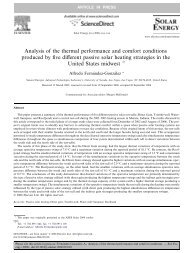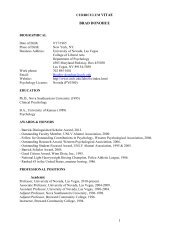2013 Conference Proceedings - University of Nevada, Las Vegas
2013 Conference Proceedings - University of Nevada, Las Vegas
2013 Conference Proceedings - University of Nevada, Las Vegas
- No tags were found...
You also want an ePaper? Increase the reach of your titles
YUMPU automatically turns print PDFs into web optimized ePapers that Google loves.
they believe the operation <strong>of</strong> averaging two numbers possesses the group properties <strong>of</strong> closure,associativity, identity, and inverses. Mevarech concludes that students’ misconceptions cannot becorrected simply by repeatedly demonstrating the correct procedure in a lecture and discussionsetting. Rather, students must have the opportunity to receive feedback and engage in correctiveactivities.Li & Li (2008) note a shift in focus for mathematics education misconception studies from afocus on deficiencies in reasoning (Brown & Burton, 1978) to a focus on the learning processitself. They suggest that advances in science education misconception research have paved theway for mathematics education researchers to better understand why student misconceptions areso resistant to change. Specifically, studies suggest that students’ initial mathematicalunderstandings <strong>of</strong>ten exhibit process-like thinking (e.g., conceptual understanding <strong>of</strong> numberbegins with counting). As students’ mathematical learning progresses, their understanding beginsto exhibit object-like thinking (e.g., a more abstract notion <strong>of</strong> number as a mathematical object).Li & Li challenge researchers to develop theories <strong>of</strong> mathematical misconceptions that take thisshift in understanding into account. Perhaps misconceptions formed during process-like thinkingpersist into students’ object-like conceptualizations <strong>of</strong> mathematics.Even as we progress in our understanding <strong>of</strong> what underlies student misconceptions <strong>of</strong>mathematics, just knowing about misconceptions is not enough. In an effort to answer Shulman’s(1986) charge to develop a coherent framework <strong>of</strong> the knowledge necessary for effectiveteaching, Ball, Thames, & Phelps (2008) propose the domains <strong>of</strong> mathematical knowledge forteaching (MKT) (Figure 1). According to the primary MKT domains, successful teachers mustpossess different types <strong>of</strong> content knowledge. First, teachers must know the content they areteaching to students in a way that most people knowledgeable in the content area do. Thisknowledge is referred to as common content knowledge (CCK). In addition to CCK, teachersmust also have knowledge <strong>of</strong> the content that enables them to understand the multiple waysstudents interact with that content as they are learning. This type <strong>of</strong> knowledge is specializedcontent knowledge (SCK) because it consists <strong>of</strong> unique knowledge <strong>of</strong> the content that teachersmust possess but a typical person knowledgeable <strong>of</strong> the content area would likely not.The MKT framework divides content knowledge closely related to the teaching and learningprocess (pedagogical content knowledge) into two primary domains: knowledge <strong>of</strong> content andstudents (KCS) and knowledge <strong>of</strong> content and teaching (KCT). KCS pertains to the ways that<strong>Proceedings</strong> <strong>of</strong> the 40 th Annual Meeting <strong>of</strong> the Research Council on Mathematics Learning <strong>2013</strong> 77




